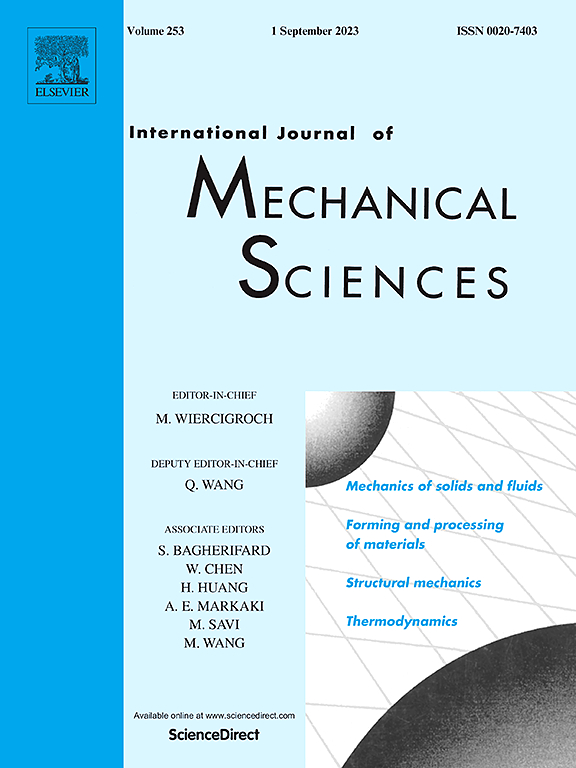A nonlinear model for soft helical bistable structures
IF 9.4
1区 工程技术
Q1 ENGINEERING, MECHANICAL
International Journal of Mechanical Sciences
Pub Date : 2025-10-03
DOI:10.1016/j.ijmecsci.2025.110899
引用次数: 0
Abstract
Nature exhibits remarkable adaptability to complex environments through the coevolution of structural strategies, such as bistable mechanisms and helical geometries. The integration of these two principles has inspired the development of biomimetic helical bistable structures. However, design of bistable helical structures is hindered by the lack of theoretical models, due to the challenges introduced by misalignment between geometric and curvature coordinates, and intrinsic nonlinearity of soft materials. In this work, we develop a nonlinear framework for soft helical bistable structures based on minimum potential energy method. This model enables the prediction of critical transition points between bistable and monostable states, as well as the resulting deformed shapes. The theoretical predictions are validated through experiments. The effects of various geometric parameters are explored using the validated model. This work provides insights into the helical bistability of soft structures.

软螺旋双稳结构的非线性模型
通过结构策略的共同进化,例如双稳态机制和螺旋几何,大自然表现出对复杂环境的卓越适应性。这两个原理的结合激发了仿生螺旋双稳结构的发展。然而,由于几何坐标与曲率坐标不一致以及软材料固有的非线性所带来的挑战,缺乏理论模型阻碍了双稳螺旋结构的设计。在这项工作中,我们建立了一个基于最小势能法的软螺旋双稳结构的非线性框架。该模型能够预测双稳态和单稳态之间的关键过渡点,以及由此产生的变形形状。通过实验验证了理论预测。利用验证的模型探讨了各种几何参数的影响。这项工作提供了对软结构的螺旋双稳性的见解。
本文章由计算机程序翻译,如有差异,请以英文原文为准。
求助全文
约1分钟内获得全文
求助全文
来源期刊

International Journal of Mechanical Sciences
工程技术-工程:机械
CiteScore
12.80
自引率
17.80%
发文量
769
审稿时长
19 days
期刊介绍:
The International Journal of Mechanical Sciences (IJMS) serves as a global platform for the publication and dissemination of original research that contributes to a deeper scientific understanding of the fundamental disciplines within mechanical, civil, and material engineering.
The primary focus of IJMS is to showcase innovative and ground-breaking work that utilizes analytical and computational modeling techniques, such as Finite Element Method (FEM), Boundary Element Method (BEM), and mesh-free methods, among others. These modeling methods are applied to diverse fields including rigid-body mechanics (e.g., dynamics, vibration, stability), structural mechanics, metal forming, advanced materials (e.g., metals, composites, cellular, smart) behavior and applications, impact mechanics, strain localization, and other nonlinear effects (e.g., large deflections, plasticity, fracture).
Additionally, IJMS covers the realms of fluid mechanics (both external and internal flows), tribology, thermodynamics, and materials processing. These subjects collectively form the core of the journal's content.
In summary, IJMS provides a prestigious platform for researchers to present their original contributions, shedding light on analytical and computational modeling methods in various areas of mechanical engineering, as well as exploring the behavior and application of advanced materials, fluid mechanics, thermodynamics, and materials processing.
 求助内容:
求助内容: 应助结果提醒方式:
应助结果提醒方式:


